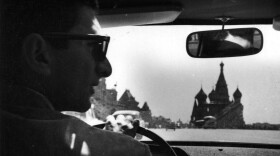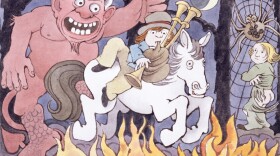
Robert Siegel
Prior to his retirement, Robert Siegel was the senior host of NPR's award-winning evening newsmagazine All Things Considered. With 40 years of experience working in radio news, Siegel hosted the country's most-listened-to, afternoon-drive-time news radio program and reported on stories and happenings all over the globe, and reported from a variety of locations across Europe, the Middle East, North Africa, and Asia. He signed off in his final broadcast of All Things Considered on January 5, 2018.
In 2010, Siegel was recognized by the Columbia University Graduate School of Journalism with the John Chancellor Award. Siegel has been honored with three Silver Batons from Alfred I. DuPont-Columbia University, first in 1984 for All Things Considered's coverage of peace movements in East and West Germany. He shared in NPR's 1996 Silver Baton Award for "The Changing of the Guard: The Republican Revolution," for coverage of the first 100 days of the 104th Congress. He was part of the NPR team that won a Silver Baton for the network's coverage of the 2008 earthquake in Sichuan Province, China.
Other awards Siegel has earned include a 1997 American Bar Association's Silver Gavel Award for the two-part documentary, "Murder, Punishment, and Parole in Alabama" and the National Mental Health Association's 1991 Mental Health Award for his interviews conducted on the streets of New York in an All Things Considered story, "The Mentally Ill Homeless."
Siegel joined NPR in December 1976 as a newscaster and became an editor the following year. In 1979, Siegel became NPR's first staffer based overseas when he was chosen to open NPR's London bureau, where he worked as senior editor until 1983. After London, Siegel served for four years as director of the News and Information Department, overseeing production of NPR's newsmagazines All Things Considered and Morning Edition, as well as special events and other news programming. During his tenure, NPR launched its popular Saturday and Sunday newsmagazine Weekend Edition. He became host of All Things Considered in 1987.
Before coming to NPR, Siegel worked for WRVR Radio in New York City as a reporter, host and news director. He was part of the WRVR team honored with an Armstrong Award for the series, "Rockefeller's Drug Law." Prior to WRVR, he was morning news reporter and telephone talk show host for WGLI Radio in Babylon, New York.
A graduate of New York's Stuyvesant High School and Columbia University, Siegel began his career in radio at Columbia's radio station, WKCR-FM. As a student he anchored coverage of the 1968 Columbia demonstrations and contributed to the work that earned the station an award from the Writers Guild of America East.
Siegel was the editor of The NPR Interviews 1994, The NPR Interviews 1995 and The NPR Interviews 1996, compilations of NPR's most popular radio conversations from each year.
-
The new anthology, edited by Henry Louis Gates Jr. and Maria Tatar, aims to make century-old stories — of flying Africans, quizzical animals and even Uncle Remus — available to new generations.
-
In one half inning, batters got to first base without touching the ball in four different ways. That's not happened in major league history in over 2 million half innings.
-
Marvin Kalb's new book is about a very interesting year — 1956 — that he spent on a diplomatic mission to what was then the U.S.S.R. It's part memoir, part context for understanding the Cold War.
-
From his cancer diagnosis to his dramatic return to Washington to casting a decisive "no" vote on the health care repeal, Sen. John McCain had an eventful week.
-
President Trump continued to attack his attorney general on Twitter. But allies of Jeff Sessions say he doesn't want to resign.
-
Vice President Mike Pence cast a tie-breaking vote that now allows the Senate to begin debating health care legislation. But what happens next on health care, no one seems to know for sure.
-
More than 20 years ago, Maurice Sendak and Arthur Yorinks collaborated on a book calledPresto and Zesto in Limboland. But they were both busy with other projects, and never bothered to publish it.
-
In One Hot Summer, historian Rosemary Ashton follows Charles Dickens, Charles Darwin and Benjamin Disraeli through an unpleasant couple of months — as the River Thames flowed with hot, smelly sewage.
-
From his exile compound in the Poconos, the cleric accused by the Turkish government of leading a failed coup attempt last year, Fethullah Gulen, denies any involvement.
-
He began covering personal technology in the 1990s, when he says tech columns were written "by geeks for geeks." As he retires, Mossberg reflects on how tech has evolved, often in unexpected ways.





